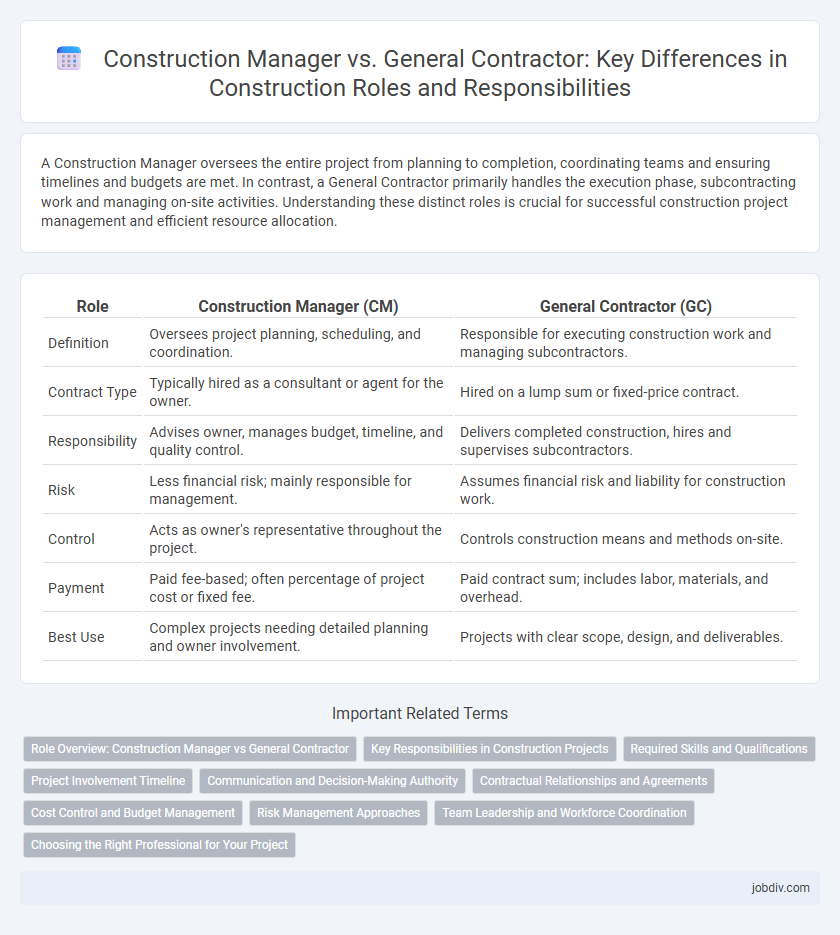A Construction Manager oversees the entire project from planning to completion, coordinating teams and ensuring timelines and budgets are met. In contrast, a General Contractor primarily handles the execution phase, subcontracting work and managing on-site activities. Understanding these distinct roles is crucial for successful construction project management and efficient resource allocation.
Table of Comparison
| Role | Construction Manager (CM) | General Contractor (GC) |
|---|---|---|
| Definition | Oversees project planning, scheduling, and coordination. | Responsible for executing construction work and managing subcontractors. |
| Contract Type | Typically hired as a consultant or agent for the owner. | Hired on a lump sum or fixed-price contract. |
| Responsibility | Advises owner, manages budget, timeline, and quality control. | Delivers completed construction, hires and supervises subcontractors. |
| Risk | Less financial risk; mainly responsible for management. | Assumes financial risk and liability for construction work. |
| Control | Acts as owner's representative throughout the project. | Controls construction means and methods on-site. |
| Payment | Paid fee-based; often percentage of project cost or fixed fee. | Paid contract sum; includes labor, materials, and overhead. |
| Best Use | Complex projects needing detailed planning and owner involvement. | Projects with clear scope, design, and deliverables. |
Role Overview: Construction Manager vs General Contractor
A Construction Manager oversees project planning, scheduling, and coordination, ensuring design compliance and budget adherence throughout the construction process. A General Contractor is responsible for managing subcontractors, procuring materials, and executing day-to-day site operations to deliver the physical construction. While the Construction Manager focuses on project management and client communication, the General Contractor handles on-site labor and resource management.
Key Responsibilities in Construction Projects
A Construction Manager oversees project planning, scheduling, and budget management, ensuring all phases align with design specifications and client expectations, while coordinating subcontractors and on-site personnel. A General Contractor primarily handles the execution of the construction work, manages labor crews, procures materials, and maintains compliance with safety regulations and building codes. Both roles require strong communication skills, but the Construction Manager focuses more on project coordination and oversight, whereas the General Contractor concentrates on day-to-day site operations and subcontractor management.
Required Skills and Qualifications
A Construction Manager requires strong project management skills, expertise in budgeting, scheduling, and coordination with design teams, combined with a background in civil engineering or construction management degrees. A General Contractor must have extensive knowledge of construction methods, subcontractor management, licensing requirements, and compliance with building codes and safety regulations. Both roles demand excellent communication abilities, problem-solving skills, and hands-on experience in overseeing construction processes to ensure project completion on time and within budget.
Project Involvement Timeline
A Construction Manager is involved from the early planning and design phases, providing input on cost estimates, scheduling, and risk management to influence project decisions. A General Contractor typically joins after final design approval, managing the actual construction process, subcontractors, and day-to-day site operations. The Construction Manager's role spans pre-construction through project completion, while the General Contractor focuses primarily on onsite execution and coordination.
Communication and Decision-Making Authority
Construction managers maintain direct communication with project stakeholders, streamlining the flow of information and fostering transparency. General contractors hold primary decision-making authority on-site, coordinating subcontractors and managing daily operations to ensure project milestones are met. Effective collaboration between construction managers and general contractors enhances project efficiency and mitigates risks associated with miscommunication.
Contractual Relationships and Agreements
Construction managers typically operate under a professional services contract that defines their advisory and supervisory roles, while general contractors enter into a lump-sum or cost-plus contract assuming responsibility for completing the project. Contracts with construction managers often emphasize collaboration with the owner and design team without direct delivery obligations, contrasting with general contractors who contractually guarantee project completion and manage subcontractors. Understanding these distinctions ensures clear expectations regarding liability, scope, and financial arrangements within the construction project's contractual framework.
Cost Control and Budget Management
Construction Managers typically provide detailed cost estimates and continuous budget oversight to ensure projects adhere to financial constraints, using real-time tracking tools for precise cost control. General Contractors manage overall project costs by coordinating subcontractors and suppliers, often negotiating bulk pricing and handling change orders to prevent budget overruns. Effective budget management relies on the Construction Manager's proactive financial planning and the General Contractor's efficient procurement and resource allocation.
Risk Management Approaches
Construction managers implement risk management by coordinating project schedules, budgets, and subcontractor performance to minimize delays and cost overruns. General contractors focus on contractual risk allocation, compliance with safety regulations, and on-site hazard mitigation to protect against liability and project disruptions. Both roles emphasize proactive risk identification and contingency planning to ensure successful project completion within scope.
Team Leadership and Workforce Coordination
Construction Managers provide strategic team leadership by overseeing project schedules, budgets, and ensuring compliance with safety standards, while General Contractors focus on direct workforce coordination and managing subcontractors on-site. Effective Construction Managers optimize resource allocation and communication flow across all project phases, enhancing productivity and risk management. General Contractors emphasize hands-on supervision and operational control, ensuring execution aligns with construction plans and quality requirements.
Choosing the Right Professional for Your Project
Selecting a Construction Manager versus a General Contractor depends on the project's complexity and delivery method, with Construction Managers providing expert oversight during design and pre-construction phases and General Contractors handling the entire build process. Construction Managers often work collaboratively with architects and owners, optimizing schedule and budget through phased management, while General Contractors assume full responsibility for subcontractor coordination and on-site construction. Evaluating project scope, risk tolerance, and desired control level ensures choosing the right professional enhances project efficiency and quality outcomes.
Construction Manager vs General Contractor Infographic

 jobdiv.com
jobdiv.com